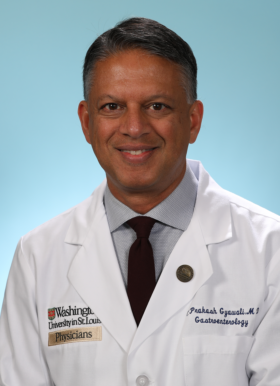
C. Prakash Gyawali, MD, MRCP
Professor of Medicine
Director, GI Fellowship Training Program
Director, Neurogastroenterology and Motility Program
- Phone: 314-747-2066
- Fax: For Patient Related Faxes Please Use 314-747-1277. For Fellowship Related Faxes Please Use 314-362-3643
Related Links
Education
- Fellowship: Washington University, St. Louis, MO (1999)
- Residency: Washington University, St. Louis, MO (1995)
- MRCP: Royal College of Physicians, London, UK (1994)
- MD: University of Calicut, Kerala, India (1990)
Biography
Dr. Gyawali joined the faculty of the gastroenterology division in 1999. He began his medical training at the University of Calicut in South India before completing internal medicine residencies in the United Kingdom and at Barnes Hospital, St. Louis. Following residency, he spent one year as associate chief resident in the Department of Medicine at Washington University School of Medicine, where he subsequently completed fellowship training in the Division of Gastroenterology. Dr. Gyawali’s clinical and research interests fall into the realm of neurogastroenterology and motility disorders. His academic interests include gastrointestinal motility, acid peptic disorders including gastroesophageal reflux disease, and functional bowel disorders. He directs the gastrointestinal motility center, and is involved in esophageal motility testing using high resolution manometry, ambulatory esophageal pH and impedance monitoring, and anorectal manometry.
“Gastroenterology is a unique specialty where time-honored patient-physician interactions in clinical medicine interact successfully with modern gadgetry and computer technology to improve the diagnosis and management of ailments affecting the gut. My academic interests are centered around the application of these modern tools to clinical gastroenterology. Computerized data acquisition and display systems can topographically ‘map out’ the esophageal peristaltic wave using data from multiple recording sites in the esophagus, revealing new information on esophageal motility disorders. Esophageal peristalsis is made up of segments of contraction, starting with skeletal muscle contraction. There are two segments of smooth muscle contraction in the esophageal body; study of these segments appears to segregate functional from organic disorders. Using an opossum model, we have shown that esophageal obstruction from fundoplication results in reproducible alterations in the characteristics of the peristaltic wave. Applying this finding to humans, we have demonstrated that the topographic pattern of organic obstruction is different enough from that of functional esophageal obstruction that a visual distinction can be made. The distal of the two smooth muscle contraction demonstrates more vigorous contraction in functional disorders. Our group continues to study the role of symptom association testing in esophageal physiologic testing, including pH and impedance monitoring. Further, we follow a large cohort of patients with functional bowel disorders, especially cyclic vomiting syndrome, and continue to further investigate these disorders. In collaboration with Dr. Greg Sayuk, we study functional bowel disorders, especially symptomatic responses to therapeutic trials using various agents including antidepressants.”